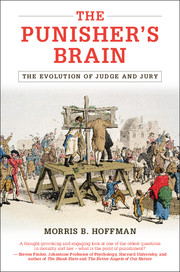Crossref Citations
This Book has been
cited by the following publications. This list is generated based on data provided by Crossref.
2014.
BOOKS RECEIVED.
The Cambridge Law Journal,
Vol. 73,
Issue. 3,
p.
656.
Jones, Owen D.
2015.
The Handbook of Evolutionary Psychology.
p.
1.
Durrant, Russil
and
Poppelwell, Zoe
2017.
Religion, Crime and Punishment.
p.
161.
Giliberto, Concetta
2017.
Old Frisian skalk: A ‘Servant’ or a ‘Rogue’?.
Amsterdamer Beiträge zur älteren Germanistik,
Vol. 77,
Issue. 1-2,
p.
117.
Hoffman, Morris B.
and
Krueger, Frank
2017.
Self, Culture and Consciousness.
p.
207.
Davis, William E.
Giner-Sorolla, Roger
Lindsay, D. Stephen
Lougheed, Jessica P.
Makel, Matthew C.
Meier, Matt E.
Sun, Jessie
Vaughn, Leigh Ann
and
Zelenski, John M.
2018.
Peer-Review Guidelines Promoting Replicability and Transparency in Psychological Science.
Advances in Methods and Practices in Psychological Science,
Vol. 1,
Issue. 4,
p.
556.
Moll, Jorge
de Oliveira-Souza, Ricardo
Basilio, Rodrigo
Bramati, Ivanei Edson
Gordon, Barry
Rodríguez-Nieto, Geraldine
Zahn, Roland
Krueger, Frank
and
Grafman, Jordan
2018.
Altruistic decisions following penetrating traumatic brain injury.
Brain,
Vol. 141,
Issue. 5,
p.
1558.
Arnhart, Larry
2018.
The evolution of private governance: Neither anarchism nor Statism.
The Review of Austrian Economics,
Vol. 31,
Issue. 2,
p.
257.
Cataldo, Quésia F.
and
de Almeida Segundo, Damião S.
2018.
Encyclopedia of Evolutionary Psychological Science.
p.
1.
Schulkin, Jay
2019.
Oliver Wendell Holmes Jr., Pragmatism and Neuroscience.
p.
199.
Raihani, Nichola J.
and
Bshary, Redouan
2019.
Punishment: one tool, many uses.
Evolutionary Human Sciences,
Vol. 1,
Issue. ,
Cataldo, Quésia F
and
de Almeida Segundo, Damião S
2021.
Encyclopedia of Evolutionary Psychological Science.
p.
7920.
Roversi, Corrado
2021.
Law and Mind.
p.
99.
Friman, Patrick C.
2021.
There is no such thing as a bad boy: The Circumstances View of problem behavior.
Journal of Applied Behavior Analysis,
Vol. 54,
Issue. 2,
p.
636.
Aharoni, Eyal
2021.
Law and Mind.
p.
207.
Yang, Qun
Bellucci, Gabriele
Hoffman, Morris
Hsu, Ko-Tsung
Lu, Bonian
Deshpande, Gopikrishna
and
Krueger, Frank
2021.
Intrinsic functional connectivity of the frontoparietal network predicts inter-individual differences in the propensity for costly third-party punishment.
Cognitive, Affective, & Behavioral Neuroscience,
Vol. 21,
Issue. 6,
p.
1222.
Hoffman, Morris B.
2021.
Law and Mind.
p.
165.
Feng, Chunliang
Yang, Qun
Azem, Lydia
Atanasova, Konstantina M.
Gu, Ruolei
Luo, Wenbo
Hoffman, Morris
Lis, Stefanie
and
Krueger, Frank
2022.
An fMRI investigation of the intention-outcome interactions in second- and third-party punishment.
Brain Imaging and Behavior,
Vol. 16,
Issue. 2,
p.
715.
Rogerson, Christine V.
Prescott, Dana E.
and
Howard, Heather G.
2022.
Teaching social work students the influence of explicit and implicit bias: promoting ethical reflection in practice.
Social Work Education,
Vol. 41,
Issue. 5,
p.
1035.
Kłusek, Michał
2023.
People Want Optimal Deterrence – Just a Little Bit.
Review of Law & Economics,
Vol. 19,
Issue. 1,
p.
99.





